31 start with D start with D
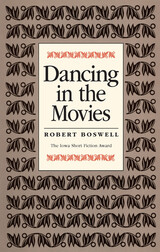
Encompassing a vast gamut of personalities, situations, and emotions, these stories penetrate our motives for doing what is right. Often there is no right or wrong, and the characters' motives for the choices they make are as diverse as the childhood memories they cherish and abhor. In the end, this book probes individual impulse and responsibility, creating stories so unerringly authentic that they become—irrepressibly—part of everyone who reads them.
"The Darkness of Love" narrates three days in the life of a black policeman, distressed by his inner fears of racism and irresistibly attracted by his wife's sister. In "Dancing in the Movies" a college student returns to his hometown, where he finds his girlfriend—a heroin addict—and tries to convince her to overcome her habit. There are stories of men at war, of lovers trying to begin a relationship, of others trying to sustain their love. Each story revolves around characters with a choice to make, and Robert Boswell renders these characters in all of their fine, vulnerable, and relentless attributes.
With this prize-winning collection, Boswell proves himself a mature craftsperson, weaving stories both poignant and profound. Each story is a vision of life, alternately dark and joyous, gritty and hopeful.
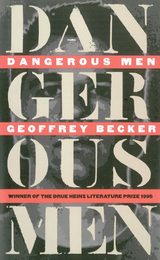
In these tightly drafted stories, Becker creates a wide variety of distinct voices, peculiar characters, and odd stettings, with tantalizing emphasis on lonliness, loss, and the ever-present struggle to find one’s place in the world. “It was wrong to think that our presence would linger on, though it was to this notion that I realized I’d been grasping all along,” the music-student narrator of “Dangerous Men” says after an evening involving drugs, a fight, and a car accident, “the idea that in some way we were etching ourselves onto the air, leaving shadows that would remain forever.”
Many of the pieces incorporate music into the storyline. Music is a gathering point in his characters’ misfit lives. In “Magister Ludi,” a seventeen-year-old girl meets up with an older local guitarist whom her younger brother has invited over to their house when their parents are gone, and plays him for her own ends: “She makes Riggy drive right through the center of town, hoping that someone will see them - one of her friends, or one of her parents’ friends even, it doesn’t matter. She just likes the idea of being spotted in this beat-up car alongside someone so disreputable.”
In “Erin and Malcom,” a bass player with an injured hand who still lives with his estranged wife, a singer, and her pet ferret, finds out how out of tune his life really is: “Something has gone wrong - he could see it in the way she looked at him over her morning bowl of cereal, and the way she didn’t as she peeled herself out of her Lycra pants and leopard shirts at night.”
Yet , even when the music seems quiet, there are tales of choice and happenstance. “El Diablo de La Cienega,” set in New Mexico, is about a boy who accepts the challenge of a mysterious figure to a game of basketball, for very high stakes indeed. Charles Baxter - one of America’s great story writers - calls the story “a small masterpiece. It has formal perfection, like a folktale. I thought it was wonderful.”
With leaps from the funny to the sad and the revelatory, these amazing stories explore dreams and longing with remarkable insight and imagination. These are stories you will not forget.

The stories in Dare the Sea explore Iran’s landscape, culture, and the undercurrent of change affecting its people—both in Iran and the United States. The stories in the first half of the collection are set in Iran in the time before and just after the Iranian Revolution of 1979. Each tale discloses the obstacles rural Iranians lived with on a daily basis and the exigencies of survival: petty theft, corruption, drug trafficking, religion, and love. Stories in the second half take place in exile, where characters are seemingly dropped into American locales like the Midwest or Hawaii, taking in their situation with only the survival skills they’ve learned in their own land and enduring the hardships of being strangers in a new country.
Loosely interconnected by reappearing characters, the stories in Dare the Sea are strongly linked by the country of Iran, its landscape, its history, and its hold on its people.
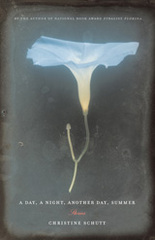
Schutt's indomitable, original talent is once again on full display in each of these deeply informed, intensely realized stories. Many of the narratives take place in a space as small as a house, where the doors are many and what is hidden behind these thin domestic barriers tends towards violence, abusive sex, and mental anguish. Schutt opens these doors in sudden, bold moments that also reveal how the characters are often hopeful, even optimistic. With a style that is at once sensual and spare, dreamlike and deliberate, she exposes the terrible intimacy of the rooms and corridors of our innermost lives.
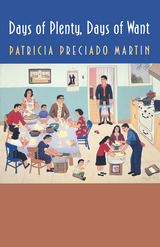
In the pages of this book are people so real you'll swear you've met them, situations so familiar you'll nod in recognition. Two of these stories have won prizes in Chicano literary contests; all will win the hearts of readers. Through them, Patricia Preciado Martin reminds us that freedom and self-expression are important in fulfilling our potential—and, more important, that a large part of this process requires acknowledging our heritage as a priceless gift whose relevance in our lives cannot be ignored.
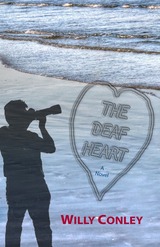
At the hospital, Max has to contend with hearing doctors, nurses, scientists, and teachers. While struggling through the rigors of his residency and running into bad luck in meeting women, Max discovers an ally in his hearing housemate Zag, a fellow resident who is also vying for certification. Toward the end of his residency, Max meets Maddy, a Deaf woman who helps bring balance to his life.
Author Willy Conley’s stories, some humorous, some poignant, reveal Max’s struggles and triumphs as he attempts to succeed in the hearing world while at the same time navigating the multicultural and linguistic diversity within the Deaf world.

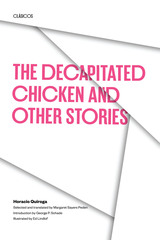
Tales of horror, madness, and death, tales of fantasy and morality: these are the works of South American master storyteller Horacio Quiroga. Author of some 200 pieces of fiction that have been compared to the works of Poe, Kipling, and Jack London, Quiroga experienced a life that surpassed in morbidity and horror many of the inventions of his fevered mind. As a young man, he suffered his father's accidental death and the suicide of his beloved stepfather. As a teenager, he shot and accidentally killed one of his closest friends. Seemingly cursed in love, he lost his first wife to suicide by poison. In the end, Quiroga himself downed cyanide to end his own life when he learned he was suffering from an incurable cancer.
In life Quiroga was obsessed with death, a legacy of the violence he had experienced. His stories are infused with death, too, but they span a wide range of short fiction genres: jungle tale, Gothic horror story, morality tale, psychological study. Many of his stories are set in the steaming jungle of the Misiones district of northern Argentina, where he spent much of his life, but his tales possess a universality that elevates them far above the work of a regional writer.
The first representative collection of his work in English, The Decapitated Chicken and Other Stories provides a valuable overview of the scope of Quiroga's fiction and the versatility and skill that have made him a classic Latin American writer.
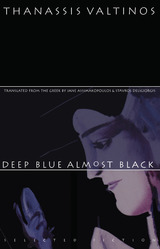
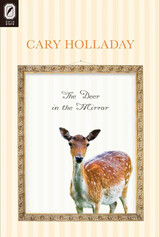

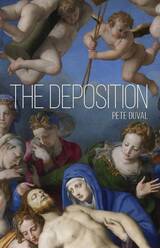

Set in bars, mortuaries, nursing homes, truck stops, and the “poverty motels that encircled downtown’s casino corridor,” Waters’s ten stories are full of misfit transients like Julian, a crematorium worker who decorates abandoned urns to create a “lush underground island,” and the instant Mormon missionary Eli, a hapless divorcé who “always likes people better when they’re a little broken.” Limo drivers, ultra-marathoners, vagabonds, and a distraught novelist-to-be populate the pages of these gritty stories.
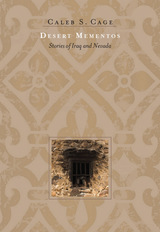
Cage captures similarities in the respective desert landscapes of both Iraq and Nevada, but it is not just a study in contrasting landscapes. The inter-connected stories explore similarities and differences in human needs from the perspectives of vastly different cultures. Specifically, the stories deftly capture the overlap in the respective desert landscapes of each region, the contrasting cultures and worldviews, and the common need for hope. Taken together, the stories represent the arc of a year-long deployment by young soldiers. Cage’s stories are bound together by the soldier’s searing experiences in the desert, bookended by leaving and returning home to Nevada, which in many ways can be just as disorienting as patrolling the Iraq desert.

Desert sonorous is a unique and energetic debut collection, blending realism with flashes of experimentation. Contemporary issues—immigration, drought, shootings—hover above a cast of memorable characters in search of life's deeper meanings. As they struggle along, comic and resigned, intelligent and quiet, sad and frustrated, their strivings resound because their lives are in so many ways our own.
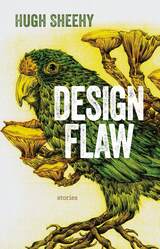
These are tales of seekers, often damaged, who find themselves caught up in skewed realities, facing lurking threats, violent deaths, strange entities, and alienating technologies. Confronted with unsettling, escalating, circumstances, the disparate cast of characters are driven toward self-revelation and perverse moments of poignancy.
A troubled high schooler traps a peer in an underground storage space. A traumatized felon returns home to rob the man who molested him as a child. A videogame help-line operator suspects a regular caller, obsessed with a disturbing role-playing game, of real-life misdeeds. In the title story, an unhappy couple adopts a “designer animal,” a genetic hybrid created to be the perfect pet. But the “grot” makes trouble in the neighborhood, becoming emblematic of a deeper problem. “Something is wrong with the world,” the narrator’s husband explains. “A design flaw. It’s so thoroughly corrupted, I’m not sure how to fix it.”
Inventive and unpredictable, these thirteen stories are wholly immersive, showing Sheehy at his captivating best.
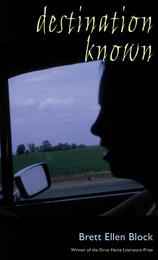
Selected by C. Michael Curtis
The characters in Brett Ellen Block’s debut collection of short stories may know their destinations, but they don’t always rush to them. From a runaway on an ice cream truck to a down-and-out retiree in a porn shop, they struggle to face both their pasts and their futures.
In a series of tightly focused and deftly drawn vignettes, Block explores the detours, potholes, and speed bumps along the road of life. These are stories about people at loose ends in their lives, coming to the realization that they can’t always sit back and enjoy the ride. Whether they’re committing petty larceny, moping their way through the winding streets and canals of Venice, or seeking to escape North Carolina’s Outer Banks, Block’s characters are learning to get behind the wheel and take control.

The modem Brazilian short story begins with the mature work of Joaquim Maria Machado de Assis (1839-1908), acclaimed almost unanimously as Brazil's greatest writer. Collectively, these nineteen stories are representative of Machado's unique style and world view, and this translation doubles the number of his stories previously available in English.
The stories in this volume reflect Machado's post-1880 emphasis on social satire and experimentation in psychological realism. If he had continued to produce the moralistic love stories and parlor intrigues of his earlier fiction, Machado's legacy would have been an entertaining but inconsequent body of work. However, by 1880 he had begun a devastating satirical assault on society through his fiction. In spite of his ruthlessness, Machado does at times reveal an ironic sympathy for his characters. He is not indifferent to human conflict but uses humor and irony to stress the absurdity of these conflicts, acted out against the backdrop of an indifferent universe. Such a spectacle creates a sense of helplessness that can only inspire wistful amusement.
In his technical mastery of the short story. Machado was decades ahead of his contemporaries and can still be considered more modern than most of the modernists themselves. That his stories elicit such strong and diverse reactions today is a tribute to their richness, complexity, and significance.
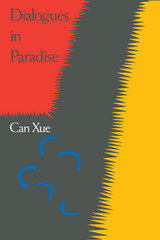

The stories in Direct Sunlight, award-winning author Christine Sneed’s latest, are inspired by the memorable strangeness of everyday life. The characters in these topically diverse tales experience events that bring the terms of their day-to-day lives and their relationships into focus in a way hitherto foreign to them.
The title story features two adult children learning of their father’s second family long after his death in the 9/11 terrorist attacks. “Mega Millions” explores the aftermath of a small-town midwestern factory employee’s enormous lottery win. In “Dear Kelly Bloom,” a young journalist takes on the role of advice columnist at a faltering Chicago newspaper around the time of the 2008 financial meltdown and soon finds himself tasked with replying to his own mother’s letter requesting guidance on family matters. In “The Monkey’s Uncle Louis,” a contentedly childless man tries to make sense of his sister’s decision to adopt a capuchin monkey after she and her husband find themselves unable to conceive a baby of their own.
The stories in Direct Sunlight rely on humor but are balanced by Sneed’s clear-eyed sobriety about the sorrows inherent in the human condition.
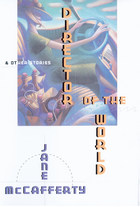
Implicit in these stories is a rootlessness that gives way to yearning and a passion for remembering. In the title story, a disturbed child, whose father has recently abandoned the family, attempts, in language reflecting her shattered sense of the world, to recapture some of their last experiences together.
These characters, and others in the collection, attempt to make sense of their broken lives and shattered thoughts. As John Wideman writes of the stories, there is “a sense of commitment to the struggle of making silent worlds speak, of forcing what is threatening or evil or destructive into some form we can see and conjure with.”

A woman is buried by a musician who has sworn to protect her. A narcoleptic is found, still dreaming, with cryptic symbols engraved into her back. In an elegant loft, a silver-haired man studies the torso of a comatose surfer, and the bodies of the two men are transformed into an intricate work of art. These are only a few of the tortous stories of Rob Hardin, a veteran studio musician and stylist whose work has been called "impeccable" by Dennis Cooper.
Distorture is a fiercely modern book full of jeweled descriptions of violent eroticism. In Distorture, his first book of stories, Rob Hardin subverts nineteenth century romanticism and redefines the aesthetics of excess. Distorture splices the digital and the autumnal with the drive of the dark ambient music and the elegance of a late Liszt Sonata.
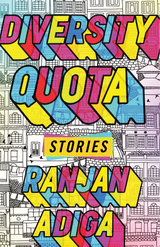
In these stories, the lines between “winners” and “losers” in a rapidly globalizing world become frayed and warped. A Nepali migrant’s worst fears materialize in “Leech.” A couple in “Denver” tries to acclimate to a new social class. A middle-aged man is attracted to his barber in “Haircut and Massage.” A Nepali professor is captivated by a white American student in “The Diversity Committee.” In often unexpected ways, Adiga captures moments of survival amid worlds colored by precarity.
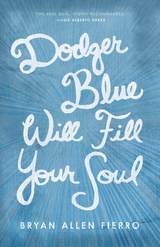
In Dodger Blue Will Fill Your Soul, Bryan Allen Fierro brings to life the people and places that form the fragile heart of the East Los Angeles community. In the title story, a father’s love of Dodger baseball is matched only by the disconnect he must bridge with his young son. In another story, a young widower remembers his wedding day with his father-in-law. The boys and men in this collection challenge masculine stereotypes, while the girls and women defy gender roles. Hope and faith in their own community defines the characters, and propels them toward an awareness of their own personal responsibility to themselves and to their families, even as they eschew those closest to them in pursuit of a different future.
Dodger Blue Will Fill Your Soul is a tour de force—the first collection of an authentic new voice examining community with humor, hope, and brutal honesty.

Winner of the 2017 California Book Awards, first fiction category
Many of these richly layered stories juxtapose the miracles of modern medicine against the inescapable frustrations of everyday life: awkward first dates, the indignities of air travel, and overwhelming megastore cereal aisles. In “Go Forth,” an aging couple attends a kidney transplant reunion, where donors and recipients collide with unexpected results; in “Hounds,” a woman who runs a facial reconstruction program for veterans nurses her dying dog while recounting the ways she has used sex as both a weapon and a salve; and in “Consider This Case,” a lonely fetal surgeon caring for his aesthete father must reconsider sexuality and the lengths people will go to have children.
Melissa Yancy’s personal experience in the milieus of hospitals, medicine, and family services infuse her narratives with a rare texture and gravity. Keenly observant, offering both sharp humor and humanity, these stories explore the ties that bind—both genetic and otherwise—and the fine line between the mundane and the maudlin. Whether the men or women that populate these pages are contending with illness, death, or parenthood, the real focus is on time and our inability to slow its progression, reminding us to revel in those moments we can control.
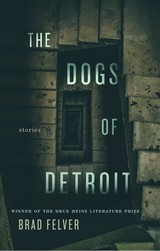

These stories convey hard, sometimes brutal, often bittersweet, experiences, but throughout Agüeros writes with artistry and unyielding compassion. Richly detailed, wry, and matter-of-fact, Dominoes and Other Stories from the Puerto Rican is an important achievement by an accomplished American writer.
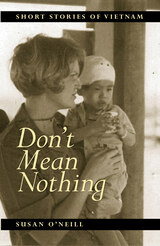
For American nurses in Vietnam, and the men among whom they worked and lived, a common defense against the steady onslaught of dead and dying, wounded and maimed, was a feigned indifference—the irony of the powerless. With the assistance of alcohol, drugs, and casual sex, "Don't mean nothing" became their mantra, a means of coping with the other war—the war against total mental breakdown.
Each or these tales offers new and profound insight into the ways the war in Vietnam forever changed the lives of everyone who served there.
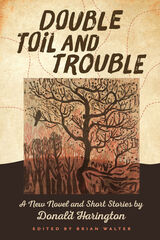
Edited by longtime Harington scholar Brian Walter, Double Toil and Trouble also includes an appendix featuring the author’s spirited correspondence with the editor who originally inspired the title novel, providing an insider’s look at the American literary scene and Harington’s own early assessment of his work. Spanning several decades of the author’s career, this volume gives readers a Harington who is at once familiar and fresh as he experiments with new formal possibilities, only to once again endear the vagaries of love, life, and folk language to us.
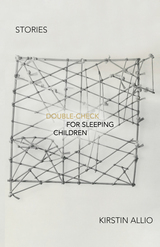
The winner of the FC2 Catherine L. Doctorow Innovative Fiction Prize, Double-Check for Sleeping Children is the newest work by award-winning writer Kirstin Allio
At once formal and tidal, damning and dreaming, Kirstin Allio’s Double-Check for Sleeping Children is charged with prayer, curse, redemption and abasement. Does truth come from reason, or beauty, or suffering? It takes the inner lives of outsiders, dark mirrors, and false ceilings to find an answer.
Families split by social class, a wealthy young widow, addicts, hunters, poor whites, a green card bride and a nursing mother: in twenty poetically and morally propulsive short stories, Allio disquiets the sublimated and palpates shadows. She leads us through the sometimes flooded, other times flood-lit halls of the human soul.
Part menacing, macabre Mary Gaitskill, part Denis Johnson in Jesus’ Son, and with the taut, wry, tell-all detail of Elizabeth Hardwick, Double-Check for Sleeping Children deals in codedness and transgression. The stories explore coming of age in middle age, anxiety about time and technology, inverted revelation. “What was I supposed to do with Basho and Mosie?” Sheila asks herself about her children in “Uncollected Territories.” “Be my real self? Hand myself over, do what you will with me, plant your strange selves in my private soil?”
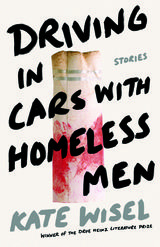
Finalist, 2019 Foreword Indies Award
Driving in Cars with Homeless Men is a love letter to women moving through violence. These linked stories are set in the streets and the bars, the old homes, the tiny apartments, and the landscape of a working-class Boston. Serena, Frankie, Raffa, and Nat collide and break apart like pool balls to come back together in an imagined post-divorce future. Through the gritty, unraveling truths of their lives, they find themselves in the bed of an overdosed lover, through the panting tongue of a rescue dog who is equally as dislanguaged as his owner, in the studio apartment of a compulsive liar, sitting backward but going forward in the galley of an airplane, in relationships that are at once playgrounds and cages. Homeless Men is the collective story of women whose lives careen back into the past, to the places where pain lurks and haunts. With riotous energy and rage, they run towards the future in the hopes of untangling themselves from failure to succeed and fail again.
READERS
Browse our collection.
PUBLISHERS
See BiblioVault's publisher services.
STUDENT SERVICES
Files for college accessibility offices.
UChicago Accessibility Resources
home | accessibility | search | about | contact us
BiblioVault ® 2001 - 2024
The University of Chicago Press









